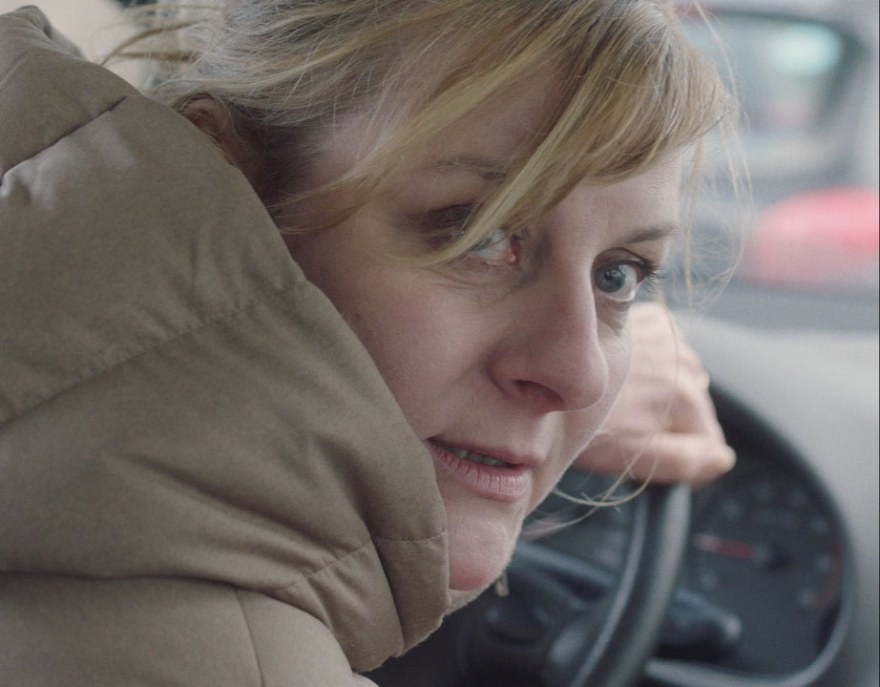Dinner with Des fleurs (Flowers)
Interview with Baptiste Petit-Gats, director of Des fleurs (Flowers)
Could you tell us a little bit about how the film developed, from the writing stage to post-production?
Since Des fleurs is my first film, the writing process has been relatively long and empirical. At first I worked alone on the characters of the mother and son, writing dozens of scenes from their lives: the son with his friends, his girlfriend, the mother at home, then both of them together. At that point, I didn’t really have a story but I was beginning to see the outlines of the characters. I wanted to talk about someone who’s unable to get away from a misfortune, a painful memory, but I wanted to translate that state through simple, concrete elements. So I decided to tighten the time-frame as much as possible and the idea of All Saints Day came naturally. Then I worked with Cyril Legrais, the script-writer, and together we developed that afternoon between the mother and her son. Making the film itself was actually pretty quick. It took a little less than a year from the beginning of financing to shooting. Casting Sacha, the son, was the biggest part of the preparatory work. With Marlène Serour, the casting director, we must have seen about sixty teenagers, and finally Victor Rivière made his mark at an impromptu casting. We filmed in Reims in mid-December 2017. The main difficulty was the lack of natural light, since the sun begins to set very early at that time of year. So we were always chasing the light, which, in hindsight, seems to go well with Bérénice’s mad dash in the film. We were both in a hurry! When it came to editing the film, I wondered whether I should do it or not, since I’m an editor myself. Then I met with some editors and decided to work with Louise Decelle. Her take on the images and her distance greatly helped the film.
The film deals with mother-son relationships and with adolescence, but also with the topic of mourning, which is treated obliquely rather than explicitly. Is it accurate to say that you wanted to let the viewer work out certain aspects of the story?
It was important for me to tell this story with very simple, concrete elements that shed light on a deeper, more complex issue in the background. In fact, the mother and son have trouble communicating, they say things rather off-handedly, they’re awkward. The nature of their relationship therefore doesn’t become evident through what they do or say here and now but through what is left unsaid and what this particular All Saints Day represents for them though they never discuss it. It was about exploring what was not shown, but was, nevertheless, omnipresent. Furthermore, as a viewer, I very much enjoy being thrust into a situation that I know nothing about and that I’m gradually able to take stock of. I very much like being in that position when I watch a film so I think I reproduce it naturally. Also, I don’t think the issue of mourning is that important. I essentially wanted to make a film about a character who is crippled by her pain and is unable to get free of it.
The soundtrack creates tension and builds up the anxiety. Is that a way of, indirectly, staging all the tension and unsaid things between the mother and her son?
The entire film is built around the idea of focusing. We follow Bérénice closely, never leaving sight of her. We are as determined as she is in her search for the right flower for the grave. The music allowed me to translate something of Bérénice beyond her actions or awkward words. I wanted to show (or hear) her internal turbulence, her tension, but I also wanted to achieve a form of fragility. Romain Trouillet, the composer, worked hard at creating layers that get added, one on top of the other, transforming. Starting with one, persistent, cold, rhythmic voice and ending with the emotion of all these voices mixing and separating. At the same time, I wanted the music to be as strong as the dialogue and atmosphere, as if the internal voices were spilling out into the world around the music. Bérénice is partially blinded by her internal turbulence, and she is unable to see what is around her, including her son.
What role do you think films, or art in general, play in the grieving process?
That’s a complex question, but I think art allows us to sublimate things. Whether that’s in the grieving process or in some other trauma or existential distress. Art allows us to talk about ourselves without talking about ourselves – that’s part of its importance.
Have you discovered any advantages that the short film form provides?
Since this was my first film, the first advantage that short films have given me is that of making a film, surrounded by a team of professionals, with a comfortable budget… even when I had hardly done anything at all before! After that, I think short films allow more space for working on a gesture, even if it’s radical. Their shortness makes it easier for the film to be a laboratory. For example, on Des fleurs, I wanted to work almost exclusively with close-ups. There are only two wide shots. I don’t know if that would be possible in a feature film where it would have seemed too obviously heavy-handed, like a form of tiring, aesthetic reflex.
Des fleurs is part of National Competition F2.









